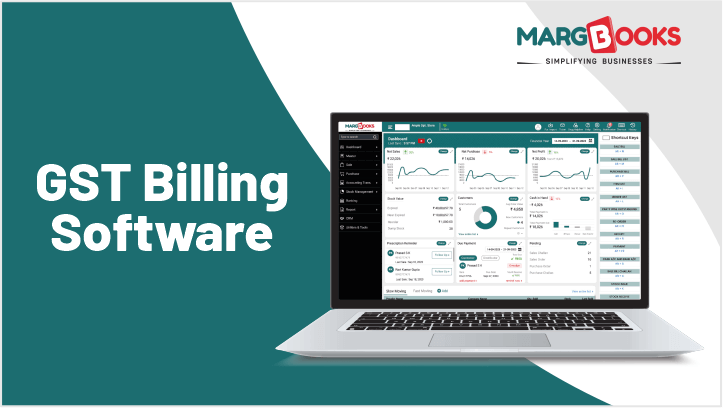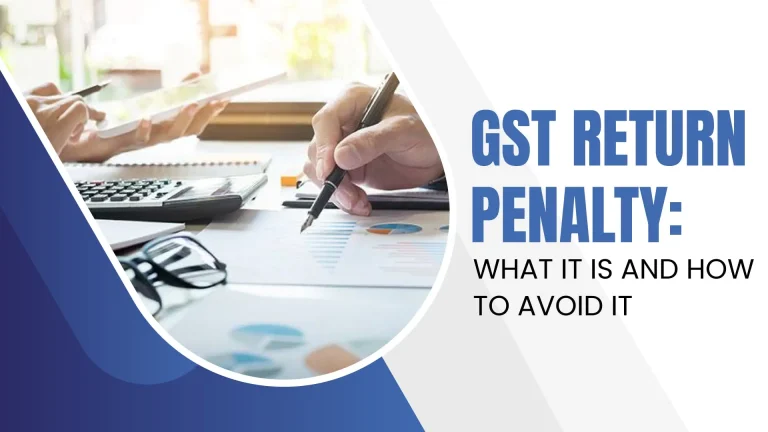The Goods and Services Tax (GST) is a major reform in India’s tax system, making it simpler and more unified. However, with these changes come new responsibilities for businesses. One of the most important tasks for businesses under GST is filing their returns accurately and on time. If they fail to do this, they can face penalties. This blog will explain what GST return penalties are, the different types, how they are calculated, and how you can avoid them.
Understanding GST Return Penalties
What is a GST Return Penalty?
A GST return penalty is a fine that the government charges businesses if they do not file their GST returns on time or if there are mistakes in the returns. These penalties are meant to make sure that businesses follow the GST rules and file their returns correctly and on time. The amount of the penalty can vary depending on what went wrong and how serious the mistake or delay was.
Why Are GST Return Penalties Imposed?
GST return penalties are imposed for several reasons:
- Late Filing of Returns: If you do not file your GST returns by the due date, you will have to pay a late fee.
- Non-Filing of Returns: If you do not file your GST returns at all, you can face more severe penalties.
- Errors in Returns: If there are mistakes or discrepancies in the GST returns you file, you may be penalized.
- Non-Payment of Tax: If you do not pay the tax due on time, you will have to pay interest and penalties.
Types of GST Return Penalties
Late Filing Penalty
If you file your GST returns late, you will have to pay a penalty of Rs. 100 per day under the CGST Act and Rs. 100 per day under the SGST Act. This means you will be charged a total of Rs. 200 per day. However, there is a maximum limit of Rs. 5,000 for this penalty. It’s important to note that there is no late fee for IGST.
Non-Filing Penalty
If you do not file your GST returns at all, the penalty can be much higher. You could be charged Rs. 10,000 or 10% of the tax due, whichever is higher. This is a significant penalty designed to make sure businesses comply with the filing requirements.
Penalty for Errors in Returns
If there are mistakes or inaccuracies in your GST returns, you could face a penalty of up to Rs. 25,000. This includes incorrect or misleading information, omissions, and other errors that affect your tax liability.
Interest on Late Payment
In addition to penalties, you also have to pay interest if you pay your taxes late. The interest rate is 18% per year for late payment of tax and 24% per year for under-reporting your tax liability.
How to Avoid GST Return Penalties
Maintain Accurate Records
One of the best ways to avoid GST return penalties is to keep accurate and up-to-date records of all your business transactions. This includes sales, purchases, and any other financial transactions that affect your GST liability. By keeping detailed records, you can ensure that your GST returns are correct and complete.
Use Reliable Accounting Software
Investing in good accounting software can help you automate the process of recording transactions and filing GST returns. Many accounting software solutions are designed specifically for GST compliance, making it easier for you to avoid errors and file your returns on time.
Regular Reconciliation
Regularly reconciling your accounts can help you identify and correct discrepancies before filing your GST returns. This means comparing your sales and purchase records with your GST returns to ensure everything matches up.
Timely Filing of Returns
Make sure you file your GST returns on or before the due date. Setting up reminders or alerts can help you remember to file on time.
Seek Professional Help
If you are unsure about the GST filing process or find it difficult to keep up with the compliance requirements, consider seeking help from a tax professional. A Chartered Accountant or a GST consultant can provide valuable guidance and help ensure your returns are filed correctly and on time.
Stay Updated with GST Regulations
GST rules and regulations can change frequently. Staying updated with the latest changes can help you remain compliant and avoid penalties. You can do this by subscribing to newsletters, attending workshops, and following reliable sources of information.
Regular Audit and Review
Conducting regular audits and reviews of your GST compliance can help you identify potential issues and correct them before they result in penalties. This includes reviewing your returns, payments, and other related documents to ensure accuracy.
Utilize the GST Portal Features
The GST portal offers various features and tools to help businesses comply with their filing requirements. Use these features to track your filing status, generate reports, and identify any discrepancies that need to be addressed.

Detailed Steps to Maintain Compliance
Understand Your Business’s GST Requirements
Different businesses have different GST requirements based on their size, turnover, and nature of operations. It’s crucial to understand what is expected from your business under the GST law. This includes knowing which returns to file, the deadlines for these returns, and the specific details that need to be included.
Regular Training for Staff
If you have a team handling GST compliance, ensure they are well-trained and updated on the latest GST regulations. Regular training sessions can help your team stay informed about any changes in the law and best practices for compliance.
Use of Checklists
Using checklists for GST compliance can help ensure that no step is missed in the process. This can include a checklist for preparing and filing returns, paying taxes, and reconciling accounts.
Monitor Notices from GST Authorities
Always keep an eye on any notices or communications from GST authorities. These notices can include important information about deadlines, compliance requirements, or any issues with your filed returns. Promptly addressing these notices can help avoid penalties.
Engage with a GST Practitioner
Engaging with a certified GST practitioner can provide an additional layer of security and expertise in managing your GST compliance. A GST practitioner can assist in preparing your returns, filing them, and addressing any issues that arise.
Common Mistakes to Avoid
Procrastination in Filing Returns
One of the most common mistakes businesses make is waiting until the last minute to file their GST returns. This can lead to errors and oversights due to the rush to meet deadlines. It’s better to start preparing your returns well in advance.
Ignoring Reconciliation
Not reconciling your accounts regularly can lead to discrepancies in your returns, which can attract penalties. Make reconciliation a routine part of your business operations.
Incorrect Input Tax Credit Claims
Claiming incorrect input tax credits can lead to penalties. Ensure that you only claim credits for which you are eligible and keep proper documentation to support your claims.
Not Updating Business Details
If there are changes in your business details, such as a change of address or contact information, ensure these are promptly updated in the GST portal. Failing to update such information can lead to compliance issues.
Overlooking Amendments in GST Law
The GST law is subject to amendments and updates. Overlooking these changes can result in non-compliance. Regularly review updates and amend your processes accordingly.
Benefits of Compliance
Avoiding Financial Penalties
The most obvious benefit of staying compliant with GST requirements is avoiding financial penalties. Penalties can be substantial and can impact your business’s financial health.
Enhancing Business Reputation
Consistent compliance with GST regulations enhances your business’s reputation. It shows that you are a responsible taxpayer, which can be beneficial for building trust with clients, suppliers, and investors.
Smooth Business Operations
Compliance with GST ensures smooth business operations. Non-compliance can lead to disruptions, such as the suspension of your GST registration, which can halt your business activities.
Better Financial Management
Maintaining accurate records and regular reconciliation as part of GST compliance leads to better financial management. You have a clearer picture of your financial status, which aids in making informed business decisions.
What are the consequences of not filing GST returns?
Failing to file GST returns can have several serious consequences:
- Penalties and Late Fees: As mentioned earlier, late filing can attract a penalty of Rs. 200 per day, up to a maximum of Rs. 5,000.
- Interest on Tax Due: You will have to pay interest on any tax due, calculated at 18% per annum.
- Ineligibility for Input Tax Credit: If you do not file your returns, you will not be able to claim the input tax credit, which can increase your tax liability.
- Suspension of GST Registration: Continued non-filing of returns can lead to the suspension of your GST registration, which means you will not be able to conduct business legally.
- Legal Action: Persistent non-compliance can result in legal action, including fines and imprisonment for severe cases.
How to Rectify Mistakes in GST Returns
Mistakes in GST returns can happen, but there are ways to rectify them:
- Identify the Mistake: The first step is to identify the mistake in your filed return. This could be an error in the tax amount, wrong details of transactions, or incorrect input tax credit claims.
- Amend in Subsequent Return: You can correct the mistake in the subsequent return. For example, if you made a mistake in the GSTR-3B for May, you can correct it in the GSTR-3B for June.
- Use the GST Portal: The GST portal allows for certain corrections and amendments. Utilize the tools and features available on the portal to make necessary corrections.
- Consult a Professional: If the mistake is complex, it’s advisable to consult a GST practitioner or a Chartered Accountant to ensure the correction is made accurately.
Utilizing Technology for GST Compliance
Advantages of Using Accounting Software
Using accounting software can significantly ease the process of GST compliance. Here are some advantages:
- Automation: Accounting software automates the process of recording transactions and filing returns, reducing the chances of human error.
- Accuracy: With built-in checks and balances, accounting software ensures that your returns are accurate and complete.
- Time-Saving: Automating routine tasks saves time, allowing you to focus on more important aspects of your business.
- Real-Time Data: Accounting software provides real-time data and insights, helping you make informed business decisions.
- Easy Reconciliation: Many accounting software solutions offer easy reconciliation features, making it simpler to match your books with your GST returns.
Features to Look for in GST Accounting Software
When choosing accounting software for GST compliance, look for the following features:
- GST Integration: Ensure the software is fully integrated with GST regulations and can handle GST invoicing, returns, and reconciliation.
- User-Friendly Interface: The software should be easy to use, with a user-friendly interface that simplifies the process of data entry and return filing.
- Regular Updates: The software should receive regular updates to stay compliant with the latest GST laws and regulations.
- Comprehensive Reporting: Look for software that offers comprehensive reporting features, allowing you to generate detailed GST reports easily.
- Customer Support: Reliable customer support is crucial in case you encounter any issues or have questions about using the software.
Common Challenges in GST Compliance and How to Overcome Them
Challenge 1: Understanding GST Regulations
GST regulations can be complex and subject to frequent changes. Staying updated and understanding these regulations is a common challenge for businesses.
Solution: Regularly attend GST workshops, subscribe to newsletters from reliable sources, and consult with GST professionals to stay informed about the latest changes and understand their implications for your business.
Challenge 2: Timely Filing of Returns
Meeting the deadlines for filing GST returns can be challenging, especially for small businesses with limited resources.
Solution: Use accounting software to automate the filing process and set up reminders to ensure you meet the deadlines. Additionally, plan your return preparation well in advance to avoid last-minute rushes.
Challenge 3: Accurate Record-Keeping
Maintaining accurate records of all transactions is essential for GST compliance but can be challenging.
Solution: Implement a robust record-keeping system and regularly reconcile your accounts. Using reliable accounting software can also help ensure accuracy and completeness in your records.
Challenge 4: Handling Input Tax Credit
Claiming the correct input tax credit can be complicated, especially if there are discrepancies between your purchase records and the GST returns filed by your suppliers.
Solution: Regularly reconcile your purchase records with your suppliers’ GST returns to ensure consistency. Address any discrepancies promptly and seek assistance from a GST professional if needed.
Challenge 5: Dealing with Notices from GST Authorities
Receiving a notice from GST authorities can be daunting and requires prompt action to avoid penalties.
Solution: Keep a close watch on any notices or communications from GST authorities. Address the issues raised in the notices promptly and consult with a GST professional to ensure a proper response.
Practical Tips for GST Compliance
Set Up a Compliance Calendar
Creating a compliance calendar can help you keep track of important GST deadlines, such as return filing dates and payment due dates. This ensures that you do not miss any critical deadlines and can plan your activities accordingly.
Establish Internal Controls
Implementing strong internal controls can help prevent errors and ensure compliance with GST regulations. This includes setting up approval processes, conducting regular audits, and segregating duties among your team members.
Conduct Periodic Reviews
Regularly reviewing your GST compliance processes can help identify areas for improvement. Conduct periodic reviews of your GST returns, payments, and other related documents to ensure they are accurate and complete.
Engage with Your Suppliers and Customers
Maintaining good communication with your suppliers and customers can help ensure smooth GST compliance. Regularly verify that your suppliers are filing their returns correctly and that you are receiving the correct input tax credit.
Use GST Tools and Resources
The GST portal offers various tools and resources to help businesses comply with their filing requirements. Utilize these tools to track your filing status, generate reports, and identify any discrepancies that need to be addressed.
Conclusion
GST return penalties can be a significant financial burden for businesses, but they can be avoided with proper planning and diligence. By maintaining accurate records, using reliable accounting software, reconciling accounts regularly, filing returns on time, seeking professional help, staying updated with regulations, conducting regular audits, and utilizing the features of the GST portal, businesses can minimize the risk of penalties and ensure compliance with GST requirements. Understanding the types of penalties and their implications is the first step toward proactive compliance. Taking these steps can help businesses avoid the financial and operational disruptions caused by GST return penalties and focus on their growth and success.
Also Read
- What Details Must be Included in a Sale Bill with GST?Getting your GST paperwork wrong feels like walking through a minefield, doesn’t it? One missing detail on your invoices, and suddenly you’re dealing with compliance headaches that could’ve been easily avoided. Creating a proper Sale Bill with GST isn’t… Read more: What Details Must be Included in a Sale Bill with GST?
- How Is a Purchase Bill with GST Different from a Sales Invoice?Running a business in today’s GST-enabled economy requires more than just selling and buying. It’s about being organised, compliant, and aware of what each document in your billing system stands for. One common confusion many businesses face is the… Read more: How Is a Purchase Bill with GST Different from a Sales Invoice?
- How Can You Generate a Mobile GST Bill in Seconds?Running a shop is hard enough. But when billing takes forever and GST compliance gets messy, things can slow down. That’s where a Mobile GST Bill comes to the rescue. Whether you run a busy garment store or a… Read more: How Can You Generate a Mobile GST Bill in Seconds?
- What Happens If GST on Advance Received Is Not Paid on Time?Running a business in India requires keeping pace with ever-evolving tax laws, and GST in advance is one such area that many businesses often overlook sometimes unintentionally. But missing out on timely GST payment on advances can lead to… Read more: What Happens If GST on Advance Received Is Not Paid on Time?
Frequently Asked Questions
What is the late fee for not filing GST returns on time?
The late fee for not filing GST returns on time is Rs. 200 per day, split into Rs. 100 under the CGST Act and Rs. 100 under the SGST Act. This fee is capped at Rs. 5,000. Additionally, interest at 18% per annum is charged on the outstanding tax amount from the due date until the payment date. To avoid these charges, ensure that you file your GST returns before the deadline.
Can I file a GST return after the due date?
Yes, you can file a GST return after the due date, but you will incur a late fee of Rs. 200 per day, up to a maximum of Rs. 5,000. Additionally, you will be charged interest on any outstanding tax at 18% per annum. Filing late can also result in loss of input tax credit and impact your compliance rating, so it is best to file on time to avoid these issues.
What happens if I don’t file my GST returns at all?
If you don’t file your GST returns, you will face severe penalties. You will be charged a penalty of Rs. 10,000 or 10% of the tax due, whichever is higher. Additionally, your GST registration may be suspended, and you could face legal action. It is crucial to file your returns to avoid these penalties and ensure your business operations are not disrupted.
How is the penalty for incorrect GST returns calculated?
The penalty for incorrect GST returns can be up to Rs. 25,000. This applies to errors such as incorrect information, misleading details, or omissions in the return. To avoid this, double-check all entries in your GST returns for accuracy before submission. Using accounting software or consulting a GST professional can help ensure your returns are correct and complete.
How much interest is charged for late payment of GST?
Interest for late payment of GST is charged at 18% per annum. If you have under-reported your tax liability, the interest rate is 24% per annum. The interest is calculated from the due date of the tax payment until the date the payment is made. It’s important to pay your GST dues on time to avoid these additional costs.
Can I correct mistakes in my GST returns after filing?
No, once a GST return is filed, it cannot be revised. However, you can correct mistakes in subsequent returns. For example, if you made an error in your May return, you can correct it in your June return. Always review your returns thoroughly before filing to minimize errors. Consulting a GST professional can also help ensure accuracy in your returns.
What should I do if I receive a notice for a GST penalty?
If you receive a notice for a GST penalty, review the notice carefully to understand the issue. Address the issues raised promptly. If the notice is for a mistake or discrepancy, correct it in your subsequent returns. Seek assistance from a GST professional if needed to ensure a proper response and avoid further penalties.
How can I avoid penalties for late GST return filing?
To avoid penalties for late GST return filing, make sure to file your returns on or before the due date. Use accounting software to automate the filing process and set up reminders to help you remember the deadlines. Regularly reconciling your accounts can also help ensure all information is accurate and up-to-date, reducing the risk of errors.
What is the penalty for non-payment of GST?
The penalty for non-payment of GST includes a fine and interest charges. The fine is Rs. 10,000 or 10% of the tax due, whichever is higher. Additionally, interest at 18% per annum is charged on the unpaid tax amount. Continuous non-payment can lead to legal action and suspension of your GST registration, so it is important to pay your GST dues on time.
Is there any way to reduce or waive GST penalties?
In some cases, you may be able to request a reduction or waiver of GST penalties by filing an appeal with the GST authorities. This is typically considered if there are valid reasons for the delay or errors, such as technical issues with the GST portal. However, these cases are evaluated individually, and there is no guarantee that the penalties will be waived. It’s best to seek professional advice for such matters.





